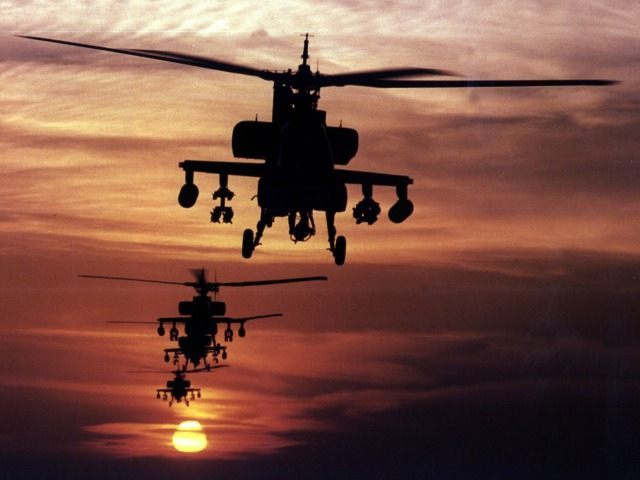The Battle of Mosul, a decisive campaign to retake that captured city from the Islamic State and drive the savages out of Iraq, was supposed to happen a long time ago. It remains in the planning stages as we head into 2016. The U.S. military is now considering committing Apache attack helicopters to the battle, along with a growing number of special-forces scouts and advisers on the ground.
Reuters reports that U.S. Army Lieutenant General Sean MacFarland, who heads up the U.S. coalition against ISIS, is “looking to retake Mosul as quickly as possible, but did not say whether he agreed with Iraqi estimates that it could be wrested from Islamic State control by the end of this year.”
“Past steps to speed up the campaign have included the deployment of dozens of U.S. special operations forces in northern Syria, and an elite targeting force to work with Iraqi forces to go after Islamic State targets,” Reuters recalls.
General MacFarland talked about deploying more military and police trainers, and encouraging allies to commit more troops to the battle, but military and Administration officials are still very careful about suggesting any significant number of U.S. ground troops will become involved.
“As we extend operations across Iraq and into Syria… there is a good potential that we’ll need additional capabilities, additional forces to provide those capabilities and we’re looking at the right mix,” said MacFarland.
Reuters notes that American officials made a similar offer of advisers and helicopter support for the long-delayed operation to recapture Ramadi, but the Iraqis chose not to request the assistance.
General MacFarland described the recapture of Ramadi as “a turning point in this campaign,” according to remarks published by the Defense Department, praising it as a victory that inflicted devastating losses on ISIS while proving the Iraqi military (with the aid of militias and tribal fighting forces) is capable of defeating them.
“The cumulative impact of our airstrikes has ground the enemy down. When applied in support of our partners, we’ve forced the enemy to give up terrain,” MacFarland said.
The Associated Press provided a less optimistic assessment, which found the Iraqi military “still struggling despite U.S. training.” Iraqi troops have reportedly made significant improvements since the low point of Iraqi troops routed by the ISIS blitz a year and a half ago, abandoning their American equipment as they fled the field. Despite optimistic official pronouncements, however, there still seems to be apprehension about sending the Iraqis into the massive, complex, dangerous, failure-is-not-an-option final showdown with ISIS in Mosul.
“Washington and Baghdad have cast the recent victory over Islamic State extremists in Ramadi as proof that training efforts are paying off and that the Iraqi military has improved,” writes the AP. “But analysts and former U.S. trainers say that despite some significant advances, the battle highlighted the troops’ lingering shortcomings. And they say that December’s success isn’t a model for retaking the much-bigger IS-held city of Mosul.”
One problem with the Ramadi model highlighted by analysts for the Associated Press is that an elite counter-terrorism unit of Iraqi special forces, trained by U.S. special forces for the better part of a decade, were the tip of the spear going into the ISIS-held city, while “Iraqi troops and armed Sunni tribesmen fresh from coalition training courses largely brought up the rear.” Their job primarily involved “holding the territory that the counterterrorism forces cleared with the help of heavy coalition air support.”
The scale of the battle for Mosul would make it extremely difficult or impossible to repeat that plan in a city with over a million civilians. The military trainers who spoke with the AP leaned more towards “impossible,” especially given that the civilian population will reduce the value of air support. Large parts of Ramadi were reduced to rubble; that is not an option in Mosul.
There are only so many elite counter-terrorism troops available to the Iraqis, and no quick way to produce more of them. The only force that might be able to fill that gap is America’s, but putting so many “boots on the ground” (even by inserting them as “advisers” who get drawn into combat despite their nominal intentions) is politically inexpedient for the Obama Administration, and possibly dangerous given the stated willingness of Shiite militias to attack American troops instead of ISIS.
The battle of Mosul must go very well, so it probably will not begin until U.S. commanders are highly confident there will not be disasters such as Iraqi troop failures, Shiite militia treachery, communication failures between the various forces, or appalling collateral damage.

COMMENTS
Please let us know if you're having issues with commenting.